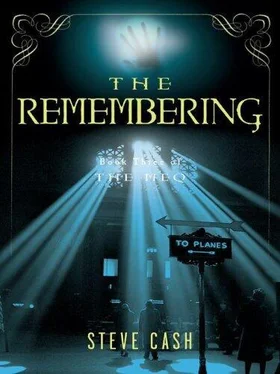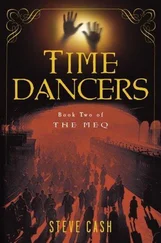Opari and I arrived back in Paris on May 4, 1969, to celebrate my hundredth birthday. As we stepped on board the Giselle , Michel handed me a piece of paper with a telephone number on it. He said to call Jack at that number — it was urgent. I called the number and was connected to Barnes Hospital in St. Louis. I asked for Jack Flowers and was transferred to a private room. Jack answered after one ring. “It’s Z,” I said. “What’s up?”
There was a long pause at the other end. Finally, Jack said, “Willie’s dead.”
“Oh, no … no.”
“Yeah,” Jack said in a whisper.
I closed my eyes and in a flash remembered nearly every moment I’d spent with Willie Croft. I missed him already. “Tell me what happened.”
I learned from Jack that Willie had gone to the airport that same morning to take his beloved de Havilland out for a short flight. At seventy-eight years old he was still a pilot and flew at least once a month. Jack said Willie taxied to the end of the runway and waited to be cleared for takeoff. A short time later he was given clearance, but he never responded. As the de Havilland idled on the runway, Willie slumped over the controls. He had suffered a massive stroke. By the time help reached him, he had fallen into a deep coma. Jack said he was taken to Barnes Hospital, where he held on for a while, then passed away less than an hour before I called.
“How is Star?” I asked.
“She’ll be all right … in time.” Jack paused and let out a long breath. “He was a good man, Z.”
“The best.”
“I figure in a week or two, we’ll take him back to Cornwall to be buried with his parents.”
“I’ll be there,” I said, “just tell me when.”
Jack and I talked for a few more minutes about Willie, then Jack said he would be in touch. I hung up the telephone with the heaviest heart I’d had in years. Sailor told me once that the Meq should celebrate every single birthday. Sometimes that is simply not possible. On May 4, 1969, there was nothing to celebrate.
On May 19 Geaxi, Sailor, and I traveled to the coast by train and took a ferry across the English Channel. Opari and Sheela and the others stayed behind in Paris and San Sebastian. Jack was to meet us in London, along with Koldo and Arrosa Txopitea. He said Willie had left Caitlin’s Ruby and a large percentage of the Daphne Croft Foundation to Koldo and his family. They would be in London to finalize the papers. Afterward, we would drive back to Cornwall for the funeral. I looked forward to seeing Koldo and Arrosa. Too many years had passed since I’d seen them last. Their twin sons, Kepa and Yaldi, were now in their early thirties. The twins were the last of the tribe of Vardules, Protectors of the Stone of Dreams, and yet I had never met them. On the crossing, I thought about what Willie had done and smiled. “Good on you, Willie!” I shouted over the water. Then I wondered if ever before there had been an independently wealthy Basque landowner in Cornwall. I laughed out loud. Koldo Txopitea had to be the first.
Arrosa was waving to us when we stepped off the train in Victoria Railway Station. She looked as beautiful as I remembered, even with silver hair and a few lines on her face, which now crisscrossed their way through the tiny scar on her left cheek. Koldo shook our hands vigorously and Jack smiled, but it wasn’t a happy smile, just a welcome one. We left the station and walked to a big Jaguar sedan parked a block away. They had concluded their business earlier that morning, so we set out immediately on the long drive to Cornwall, with Jack and Koldo taking turns at the wheel.
I asked Koldo, “What would your grandfather think of this car?”
Koldo grinned. “If he were here, I would not have this car.”
Even Sailor laughed at that, having known Kepa well.
The next three days were quiet, relaxed, easygoing, and sometimes awkward, almost like Willie himself. The funeral was simple and solemn, and Star was gracious and patient, personally thanking every person who came, and there were many. The Crofts had been generous contributors to the whole community for generations. Koldo and Arrosa had become an integral part of the community years ago, and they, too, accepted condolences. The twins, Kepa and Yaldi, were not there, nor were they at Caitlin’s Ruby. I learned on the drive to Cornwall that both were professional musicians and both were currently on tour. Kepa was a classical pianist and Yaldi was a rock guitarist, and yet Koldo said they were very much alike. I looked forward to meeting them, but it would have to be another time.
Carolina had stayed in St. Louis, saying the trip would be too long and difficult. However, she did send a short letter, which Star handed to me as soon as I arrived. In the letter she said it was past time I came home, if not for good, at least for a visit. She reminded me that she was approaching three digits in age. With typical Carolina good humor, the letter ended, “A girl can only wait so long.” I folded the letter carefully and slipped it in my back pocket. I felt guilty because I wanted to go, and probably should go, but I knew I couldn’t. Not now, not yet. I owed it to the others to solve the mystery of the spheres. They would never say it aloud or display it in any obvious manner, yet each and every Meq, including Opari, believed that I was the only one who could truly do it. I had to return to East Germany and the spheres. The awkward moments came when Star asked when I would be coming back to St. Louis. I had to tell her I didn’t know, but I couldn’t tell her why. Star leaned over and whispered in my ear. “ZeeZee,” she said, using a name she hadn’t called me since she was three years old. “Mama needs to see you. I don’t know how much time we have left with her. She’s strong now, but …”
Star was now sixty-eight years old herself. I knew she was telling the truth. “I’ll be there soon, Star,” I said, then added, “I promise,” hoping that I was telling the truth.
Jack and Star left Caitlin’s Ruby for home on the morning of May 25. I made the same promise to Jack as I’d made to Star, and we said our farewells. Before we left the next day, Geaxi, Sailor, and I took a long walk along one of the six paths that Caitlin had cleared centuries earlier. It made no difference which path we chose because they all led to the same place. It was a wild and desolate, nearly barren hill on the western corner of the property, an ancient station from a distant past known as Lullyon Coit or, as Geaxi called it, “the slabs.” It was here in 1918 that Sailor took down the huge stone structures that had stood upright for millennia. In a fit of bitter rage, which he never fully explained, and using only his mind and his “ability” of telekinesis, he shook the tons of granite and the ground beneath them until the sacred stones collapsed and fell like dominoes in just a few seconds.
Now several rugged wildflowers poked their way up between and around the giant, scattered “slabs.” The wind was down, and Geaxi spread a blanket across one of the stones. I brought cheese and bread and a basket of fresh strawberries. Sailor brought a bottle of wine and three tin cups, perfect for a picnic on a bright and clear day in Cornwall. Four miles away, along the horizon to the south and west, the open sea was visible, which was rare at Caitlin’s Ruby.
Sailor uncorked the wine and filled our cups. He stood and looked as far to the west as he could, to where the sky and sea became one. “We have time, Zianno,” he said. “Or should I say we still have enough time?”
“Enough time?”
“Yes. Do not pressure yourself in your study of the spheres. We have forty-eight years to answer their riddles, forty-eight years before the Remembering is upon us.”
Читать дальше












